Related Research Articles
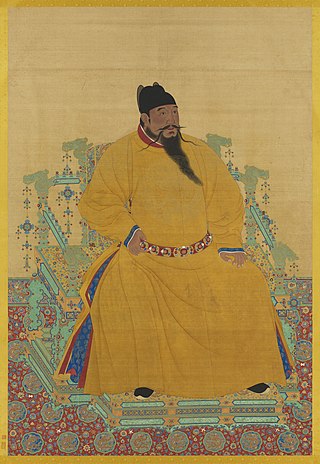
The Yongle Emperor, personal name Zhu Di, was the third emperor of the Ming dynasty, reigning from 1402 to 1424.

Hongwu Emperor, also known by his temple name as the Emperor Taizu of Ming (明太祖), personal name Zhu Yuanzhang, courtesy name Guorui, was the founding emperor of the Ming dynasty, reigning from 1368 to 1398.
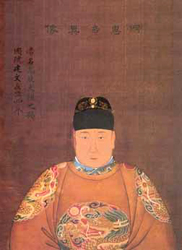
The Jianwen Emperor, personal name Zhu Yunwen (朱允炆), also known by his temple name as the Emperor Huizong of Ming (明惠宗) and by his posthumous name as the Emperor Hui of Ming (明惠帝), was the second emperor of the Ming dynasty, reigned from 1398 to 1402. Zhu Yunwen's father was Zhu Biao, the eldest son and crown prince of the Hongwu Emperor, the founder of the Ming dynasty. Zhu Biao died at the age of 37 in 1392, after which the Hongwu Emperor named Zhu Yunwen as his successor. He ascended the throne after the Hongwu Emperor's death in June 1398.
Zhu Biao was the Hongwu Emperor's eldest son and crown prince of the Ming dynasty. His early death created a crisis in the dynasty's first succession that was resolved by the successful usurpation of his brother Zhu Di as the Yongle Emperor, an act with far-reaching consequences for the future of China.
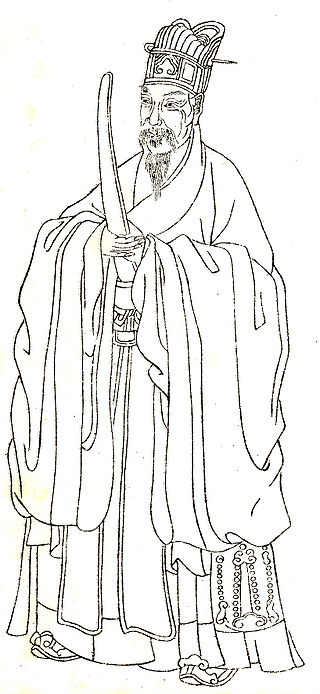
Liu Ji, courtesy name Bowen, better known as Liu Bowen, was a Chinese military strategist, philosopher, and politician who lived in the late Yuan and early Ming dynasties. He was born in Qingtian County. He served as a key advisor to Zhu Yuanzhang, the Hongwu Emperor, the founder of the Ming dynasty, in the latter's struggle to overthrow the Yuan dynasty and unify China proper under his rule. Liu is also known for his prophecies and has been described as the "Divine Chinese Nostradamus". He and Jiao Yu co-edited the military treatise known as the Huolongjing.
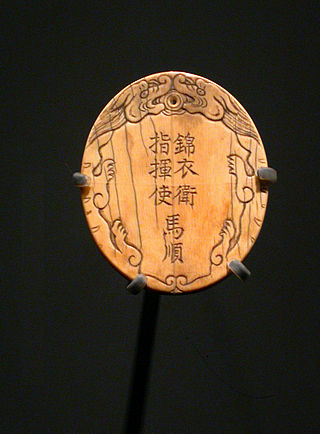
The Embroidered Uniform Guard was the imperial secret police that served the emperors of the Ming dynasty in China. The guard was founded by the Hongwu Emperor in 1368 to serve as his personal bodyguards. In 1369 it became an imperial military body. They were given the authority to overrule judicial proceedings in prosecutions with full autonomy in arresting, interrogating and punishing anyone, including nobles and the emperor's relatives.

Chang Yuchun, courtesy name Boren and art name Yanheng, was a Chinese military general of the Ming dynasty. He was a follower of Zhu Yuanzhang, the founding emperor of the Ming dynasty, and contributed heavily to the establishment of the Ming Empire. He was famous for his bravery and formidable prowess in battle, which earned him the nickname of "Chang Hundred-Thousand" (常十万), because he alone was said to be as effective as a force of 100,000 troops.
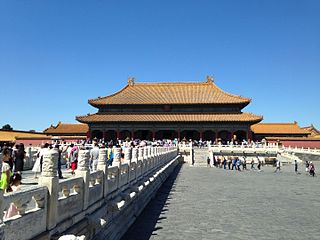
In the now-abolished Chinese monarchy, various methods had been used to determine succession to the Chinese throne. The Mongol-led Yuan dynasty practiced blood tanistry, or competition among brothers, while the Ming dynasty favored primogeniture, with an emperor succeeded by his eldest son. During the Manchu-led Qing dynasty, an emperor would write an edict to select one of his sons in secret. An emperor could have numerous sons by women of various ranks, so the heir might not be obvious until it was announced.
Basalawarmi, commonly known by his hereditary noble title, the Prince of Liang, was a Yuan dynasty prince and loyalist who fought against the Ming dynasty. He was a descendant of Khökhechi, the fifth son of Kublai Khan. After the Ming took over Yunnan, the Hongwu Emperor exiled Basalawarmi's family to Korea.
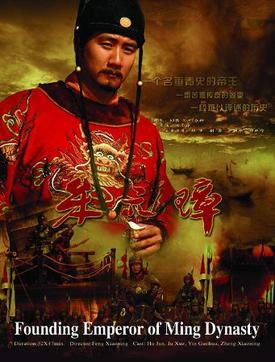
Founding Emperor of Ming Dynasty is a Chinese television series based on the life of Zhu Yuanzhang, the founding emperor of the Ming dynasty. Directed by Feng Xiaoning and starring Hu Jun as the Hongwu emperor, the series was first aired on CCTV in China in 2006.
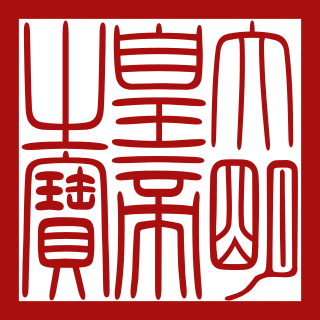
The House of Zhu was a Chinese imperial ruling house of the Ming dynasty (1368–1644) and Southern Ming dynasty (1644–1662). They also held the title "Duke of Wu" and "King of Wu" from 1361 to 1368 as well as "Marquis of Zhu" from 1725 to 1929.
Empress Xiaominrang, of the Ma clan, was the empress consort to the Jianwen Emperor and the second empress consort of China's Ming dynasty.
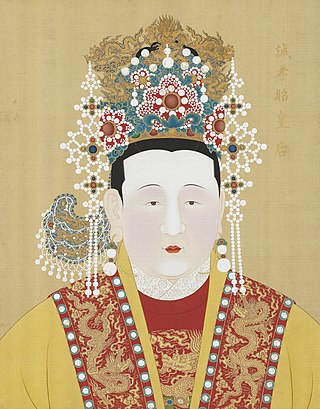
Empress Chengxiaozhao, of the Zhang clan, was a Chinese empress consort of the Ming dynasty, married to the fourth Ming ruler, the Hongxi Emperor. He only ruled for one year, so she then served as Empress dowager after the accession of her son the Xuande Emperor. She later served as the Regent of China during the minority of the reign of her grandson, Emperor Yingzong of Ming, from 1435 until 1442.
The Ming campaign against the Uriankhai was a 1387 offensive military expedition by Ming China's army led by General Feng Sheng against the Uriankhai Mongol horde led by the chieftain Naghachu in Manchuria, which concluded with the surrender of the Uriankhai to the Ming and the capture of Manchuria by the Ming.
The Battle of Buir Lake was fought between Ming China and Northern Yuan at the Buir Lake in 1388. The Ming army was led by General Lan Yu, who undertook the military campaign against the Northern Yuan horde led by Tögüs Temür. The Ming army defeated the Northern Yuan horde at the Buir Lake and captured many of their people.
The Four Major Cases of the early Ming dynasty refer to the following mass executions and persecutions perpetrated by the Hongwu Emperor at the start of the Ming dynasty:

Xie Jinyin, courtesy name Da Shen (大绅), or Jin Shen (缙绅), titled with Chunyu (春雨), Xi Yi (喜易), a native of Jishui County, Ji'an City, Jiangxi Province, and ancestry of Daizhou County, Taiyuan City, Shanxi Province, literary scholar Nei Ge Shou Fu (Chief Minister of the Cabinet, 内阁首辅), during the early Ming Dynasty.
Zhao Yong was a Chinese military general during the early Ming dynasty. He was a younger brother of Zhao Zhongzhong (趙仲中).
The Ming conquest of Sichuan saw the Ming Dynasty conquer Sichuan from the Ming Xia Kingdom from 1370 to 1371. Besides being situated in a rich province, Xia also prevented further Ming Dynasty expansion into southwestern areas such as Yunnan. The Ming Dynasty's ultimate victory marked the unification of China proper by the Hongwu Emperor.
References
Citations
- ↑ Zhang Tingyu et al. History of Ming, Volume 132, Biography of Chang Yuchun.
- ↑ Jonathan Neaman Lipman (2011). Familiar Strangers A History of Muslims in Northwest China. University of Washington Press. p. 38. ISBN 9780295800554.
- 1 2 3 Zhang Tingyu et al. History of Ming, Volume 132, Biography of Lan Yu.
- ↑ Dun J. Li The Ageless Chinese (Charles Scribner's Sons: 1971), p. 276
Bibliography
- Zhang Tingyu et al. History of Ming , Volume 132, Biography of Lan Yu.